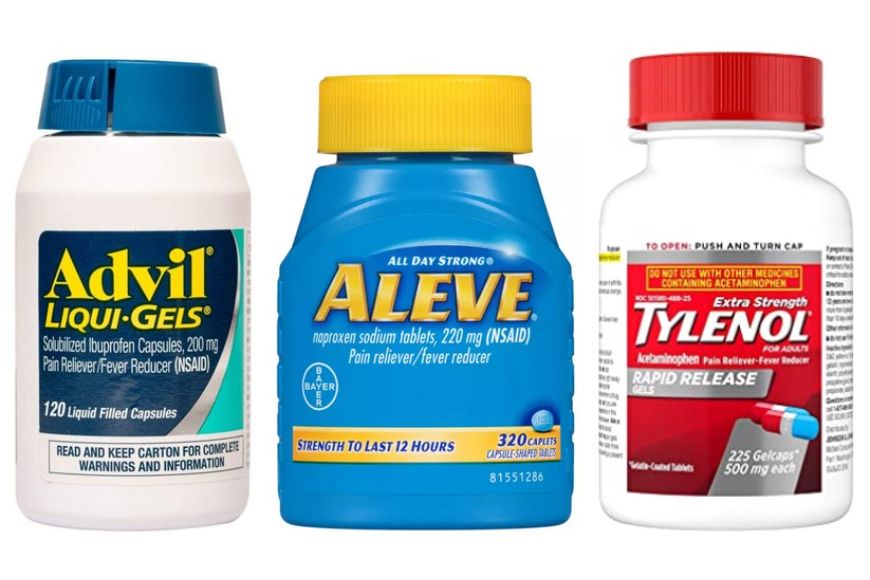What are the Differences Between Tylenol, Advil, and Aleve?

We’ve all had that moment in the drugstore. You’re standing in the pain relief aisle, and you’re wondering which medicine to buy. Between Tylenol, Advil, and Aleve, which is the best to alleviate mild discomfort from muscle aches or pain from mild injury? The answer to this ultimately comes from the active ingredient in each drug. In this blog, we’ll talk through those details and in which scenario Tylenol, Advil, and Aleve may be the most useful to you. As always, consult your doctor before making any medical decisions regarding your health.
What are the primary ingredients in each drug?
The real difference between these three drugs is that they each have a different main ingredient.1
- Tylenol’s primary ingredient is acetaminophen
- Advil’s primary ingredient is ibuprofen
- Aleve’s primary ingredient is naproxen
Knowing this information can help you choose the best one for whichever specific injury or ailment you may have.
How do I know which medication to choose?
Acetaminophen (Tylenol) provides pain relief and is suitable for use in all ages. It may be given to infants, and it is available as a pill, chewable tablet, or a liquid form. That said, it can cause serious liver damage if you take more than the recommended dosage. If you have any liver abnormalities or you take medications affecting your liver function, consult your doctor before using Tylenol. Acetaminophen is okay to use right up until surgery with your doctor’s approval.1
Ibuprofen (Advil and Motrin) also provides pain relief and works as an anti-inflammatory to reduce swelling. It is not suitable for individuals under the age of 6 months. It is generally long-acting than Tylenol and is also available as a pill, chewable tablet, and in liquid form. It is best to take ibuprofen with food or milk to avoid any GI side effects, and thus it is often best to avoid taking ibuprofen if you are vomiting, dehydrated, or not eating much. Furthermore, it may not be suitable for those with gastrointestinal or kidney abnormalities; consult a trusted medical professional before taking ibuprofen in this scenario. Do not use ibuprofen for 72 hours prior to surgery.1
Naproxen (Aleve) provides pain relief and works as an anti-inflammatory. It is longer-lasting than both acetaminophen and ibuprofen. It is not suitable for patients under 2 years old. Over the counter, you can purchase it in pill form. By prescription, it is available in liquid form. It should not be taken if you have gastrointestinal or kidney abnormalities or with a medication affecting kidney function. Naproxen must be taken with food or milk and may not be used for 72 hours prior to surgery.1
Make sure you have the proper dosage
Regardless of what medication you select for your needs, make sure you follow the dosage recommendations. Often, individuals take these medications when they have aches and pains during cold and flu season. Unfortunately, the active ingredients in Tylenol and Advil are often found in other cold and cough medications. To avoid double dosing, make sure you read the packaging and talk to your doctor. It is possible to overdose, and it can be dangerous for your stomach, kidney, and liver.
Save on medication with America’s Pharmacy
Cold and flu season is here! If you feel like you’re living at the pharmacy these days, at least get a discount on medication while you’re there. Visit America’s Pharmacy and save up to 80% on medication for your whole family (pet medications included!).
RELATED ARTICLE: Is it Safe to Take Advil and Aleve Together?
Sources:
1. https://www.hss.edu/pediatrics-difference-between-tylenol-advil-aleve.asp
